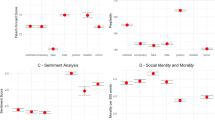Abstract
Misinformation has attracted widespread research attention owing to the importance and challenges of addressing the problem. Despite the progress in developing computational methods for misinformation detection and identifying psycholinguistic factors and network properties of misinformation, there is a lack of understanding of language alternation in online misinformation communication. This research aims to address the literature gap by answering several key questions regarding language alternation in communicating misinformation online. Based on the analysis of structured and un-structured survey responses, the results of this study show that it is fairly common for speakers of English as a second language to alternate languages in communicating misinformation online. In addition, it identifies the motives and impacts of such behavior. The findings of this study point to a new avenue for addressing the challenges of detecting online misinformation.
Access this chapter
Tax calculation will be finalised at checkout
Purchases are for personal use only
Similar content being viewed by others
References
Del Vicario, M., et al.: The spreading of misinformation online. Proc. Natl. Acad. Sci. 113, 554–559 (2016)
Bessi, A., Coletto, M., Davidescu, G.A., Scala, A., Caldarelli, G., Quattrociocchi, W.: Science vs conspiracy: collective narratives in the age of misinformation. PloS ONE 10(2), p. e0118093 (2015). https://doi.org/10.1371/journal.pone.0118093
Guess, A., Nyhan, B., Reifler, J.: Selective exposure to misinformation: evidence from the consumption of fake news during the 2016 US presidential campaign. Eur. Res. Counc. 9(3), 1–49 (2018)
Grinberg, N., Joseph, K., Friedland, L., Swire-Thompson, B., Lazer, D.: Fake news on Twitter during the 2016 US presidential election. Science 363(6425), 374–378 (2019)
Anderson, J., Rainie, L.: The future of truth and misinformation online. Pew Res. Cent. 19, 1–224 (2017)
Hameleers, M., van der Meer, T.G.: Misinformation and polarization in a high-choice media environment: how effective are political fact-checkers? Commun. Res. 47, 227–250 (2020)
Torabi Asr, F., Taboada, M.: Big data and quality data for fake news and misinformation detection. Big Data Soc. 6(1), 1–14 (2019). https://doi.org/10.1177/2053951719843310
Zhang, C., Gupta, A., Kauten, C., Deokar, A.V., Qin, X.: Detecting fake news for reducing misinformation risks using analytics approaches. Eur. J. Oper. Res. 279(3), 1036–1052 (2019). https://doi.org/10.1016/j.ejor.2019.06.022
Kumar, K.P.K., Geethakumari, G.: Detecting misinformation in online social networks using cognitive psychology. Human-centric Comput. Inf. Sci. 4(1), 1–22 (2014). https://doi.org/10.1186/s13673-014-0014-x
Amorim, R.: Code switching in student-student interaction; functions and reasons! Linguística: Revista de Estudos Linguísticos da Universidade do Porto 7, pp. 177–195 (2012)
Bensen, H., Çavusoglu, Ç.: Reasons for the teachers’ uses of code-switching in adult EFL classrooms. Hasan Ali Yücel Egitim Fakültesi Dergisi 10, 69–82 (2013)
Eldin, A.A.T.S.: Socio linguistic study of code switching of the Arabic language speakers on social networking. Int. J. Engl. Linguist. 4, 78–86 (2014)
Tuđman, M., Mikelic, N.: Information science: science about information misinformation and disinformation. In: Proceedings of Informing Science + Information Technology Education, vol. 3, pp. 1513–1527 (2003)
Vicario, M.D., Quattrociocchi, W., Scala, A., Zollo, F.: Polarization and fake news: Early warning of potential misinformation targets. ACM Trans. Web (TWEB) 13, 1–22 (2019)
Shao, C., Hui, P.-M., Cui, P., Jiang, X., Peng, Y.: Tracking and characterizing the competition of fact checking and misinformation: case studies. IEEE Access 6, 75327–75341 (2018)
Wang, P., Angarita, R., Renna, I.: Is this the era of misinformation yet: combining social bots and fake news to deceive the masses. In: Companion Proceedings of the The Web Conference 2018, pp. 1557–1561 (2018)
Kim, J., Tabibian, B., Oh, A., Schölkopf, B., Gomez-Rodriguez, M.: Leveraging the crowd to detect and reduce the spread of fake news and misinformation. In: Proceedings of the 11th ACM International Conference on Web Search and Data Mining, pp. 324–332 (2018)
Tschiatschek, S., Singla, A., Gomez Rodriguez, M., Merchant, A., Krause, A.: Fake news detection in social networks via crowd signals. In: Companion Proceedings of the The Web Conference 2018, pp. 517–524 (2018)
Woolard, K.A.: Codeswitching. In: A Companion to Linguistic Anthropology, pp. 73–94 (2004)
Gumperz, J.J.: Discourse Strategies. Vol. 1. Cambridge University Press, Cambridge (1982)
Halim, N.S., Maros, M.: The functions of code-switching in Facebook interactions. Procedia-Soc. Behav. Sci. 118, 126–133 (2014)
Gammaldi, F.: Motivations for code-switching in blogs of Italian expats living in the Netherlands. Master’s thesis, Universiteit Leiden, pp. 1–73 (2016)
Al-Qaysi, N., Al-Emran, M.: Code-switching usage in social media: a case study from Oman. Int. J. Inf. Technol. Lang. Stud. 1, 25–38 (2017)
Jagero, N., Odongo, E.: Patterns and motivations of code switching among male and female in different ranks and age groups in Nairobi Kenya. Int. J. Linguist. 3, 1–13 (2011)
Acknowledgements
This research is partially supported by U.S. National Science Foundation (Award #: SES 1527684). Any opinions, findings, and conclusions expressed in this material are those of the authors and do not necessarily reflect the views of NSF.
Author information
Authors and Affiliations
Corresponding author
Editor information
Editors and Affiliations
Rights and permissions
Copyright information
© 2020 Springer Nature Switzerland AG
About this paper
Cite this paper
Zhou, L., Lim, J., Alsaleh, H., Wang, J., Zhang, D. (2020). Language Alternation in Online Communication with Misinformation. In: Lang, K.R., et al. Smart Business: Technology and Data Enabled Innovative Business Models and Practices. WeB 2019. Lecture Notes in Business Information Processing, vol 403. Springer, Cham. https://doi.org/10.1007/978-3-030-67781-7_15
Download citation
DOI: https://doi.org/10.1007/978-3-030-67781-7_15
Published:
Publisher Name: Springer, Cham
Print ISBN: 978-3-030-67780-0
Online ISBN: 978-3-030-67781-7
eBook Packages: Computer ScienceComputer Science (R0)




